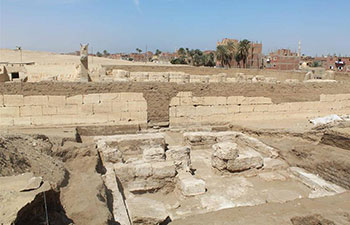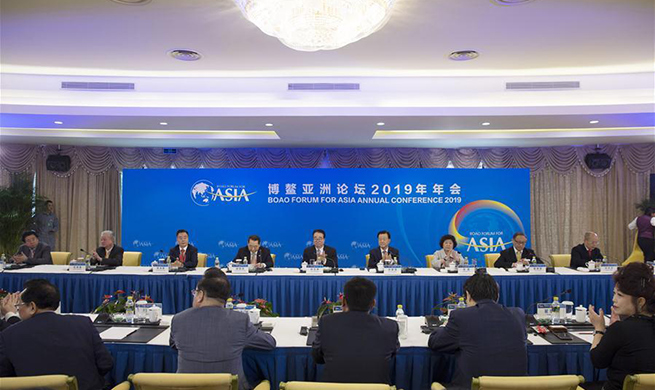LONDON, March 29 (Xinhua) -- British Prime Minister Theresa May's Brexit plans were thrown into chaos Friday when MPs rejected her EU withdrawal deal for a third time.
MPs voted 344 to 286 against May's deal. According to the prime minister, the implications of their decision were grave.
Facing calls for a snap general election, May now has until April 12 to inform the EU about alternative arrangements for Brexit, or leave the Union on that date with no deal.
But she also faced a call from one of her own MPs to quit Downing Street to make way for a new prime minister.
Steve Baker, deputy chairman of the pro-Brexit European Research Group (ERG) of Conservative backbench MPs, said in a statement: "This must be the final defeat for Theresa May's deal. It's finished. And we must move on."
Baker added: "I regret to say it is time for Theresa May to follow through on her words and make way so that a new leader can deliver a withdrawal agreement which will be passed by Parliament. This has been a tragic waste of time and energy for the country. We can waste no more."
In a grim warning to MPs ahead of the vote, May said there was a risk of Brexit being wrecked.
May went into a specially called Friday sitting of the House of Commons knowing that her controversial deal had been rejected twice already by margins of 230 and 149.
Her hopes that she might prove true the old adage -- third time lucky -- was given a boost on Wednesday when MPs rejected eight alternative Brexit options.
But the political mountain proved too high for May, and in the third vote she lost by 344 to 286. The margin had been narrowed to 58, still too far out of reach.
Around 34 of May's own Conservatives voted against her deal, while five Labour MPs voted in favor of her deal. The 10 Democratic Unionist Party (DUP) MPs, who give May's Conservative government its majority, all voted against her deal.
Had the DUP changed its mind, May could just about have scrambled over the line.
But the long-standing fears over Northern Ireland being trapped in an EU 'backstop' over the border issue with the Irish Republic proved a massive stumbling block.
Despite written guarantees the fear remained that Northern Ireland could be locked into EU rules indefinitely if the 'backstop' arrangement came into play.
The fear of that arrangement breaking up the United Kingdom remained big among politicians on both sides of the Irish Sea.
Speaking after the vote, May said: "The implications of the decision are grave. The legal default now is that the UK is due to leave the EU on April 12, in just 14 days' time.
"This is not enough time to agree, legislate for and ratify a deal, and yet the House has been clear it will not permit leaving without a deal. And so we will have to agree an alternative way forward."
The prime minister said it was almost certain that Britain would have to take part in the European Parliament elections in May.
She said that next Monday, the House of Commons will continue the process to see if there is a stable majority for a particular alternative scenario for Britain's future relationship with the EU.
"This government will continue to press the case for the orderly Brexit that the result of the referendum demands," said May.
Some political commentators interpreted May's comments as a signal that she may opt for a general election.
After Speaker John Bercow announced the result of the vote, Jeremy Corbyn, leader of the main opposition Labour Party, and Ian Blackford, leader at Westminster of the Scottish Nationalist Party (SNP), both said that May should now call a general election. Blackford also called for Article 50 -- the process that triggered the countdown to Britain's withdrawal from the EU -- to be revoked. That would mean scrapping Britain's departure altogether.
Vince Cable, leader of the minority Liberal Democrats, called for a second public referendum on EU membership.
In Brussels, Donald Tusk, president of the European Council, announced he had called for an emergency European Council summit on April 10.













